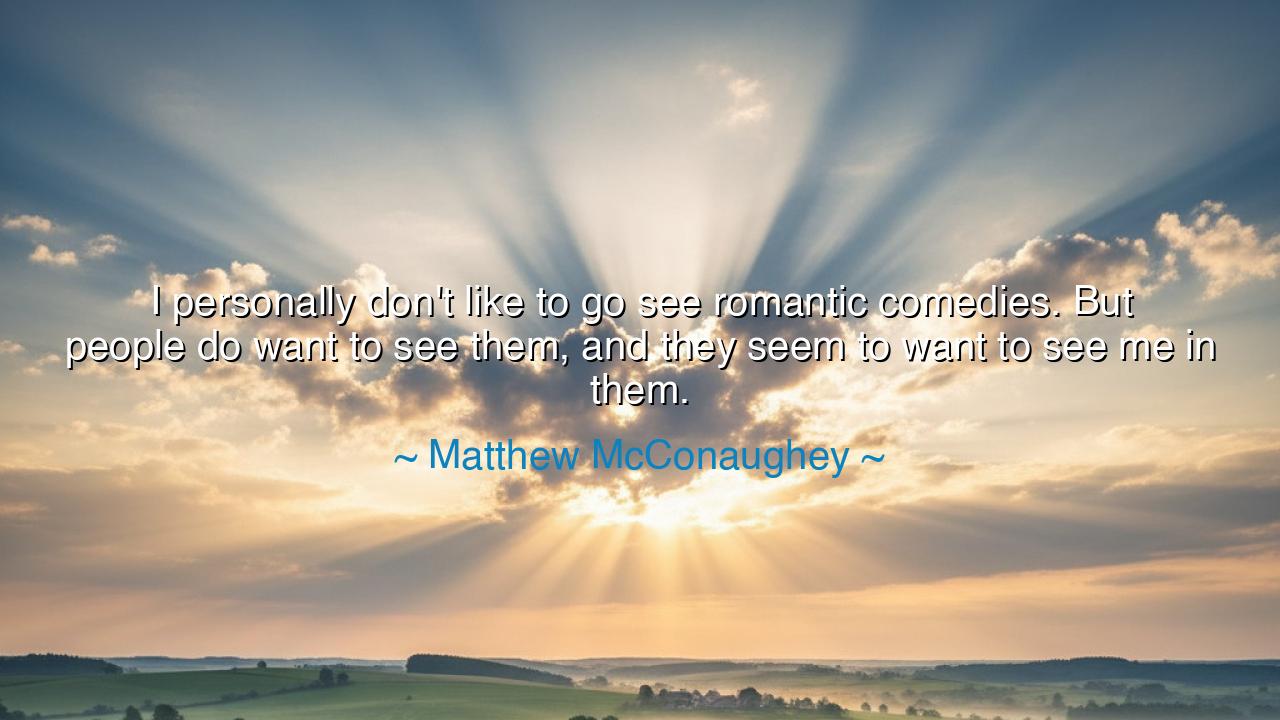
I personally don't like to go see romantic comedies. But people
I personally don't like to go see romantic comedies. But people do want to see them, and they seem to want to see me in them.






In the words of Matthew McConaughey, "I personally don't like to go see romantic comedies. But people do want to see them, and they seem to want to see me in them," we encounter a candid reflection on the tension between personal preferences and public expectation. McConaughey’s admission speaks to the complexity of an artist's relationship with their craft. While he may not be personally inclined toward the genre of romantic comedy, he understands that his audience has a different desire, one that resonates with their need for hope, connection, and the joy of love expressed in a light-hearted form. This juxtaposition—the artist’s personal inclinations and the public’s expectations—echoes a truth that has been explored by philosophers and artists for centuries: the balance between individual authenticity and societal demand.
In the realm of ancient philosophy, this theme resonates with the teachings of Socrates, who famously encouraged the search for personal truth through self-examination. Yet, Socrates also acknowledged the reality that the public's desires often differed from the philosopher’s higher calling. He was keenly aware of the tensions between self-expression and societal conformity, yet he also understood that in certain contexts, one must engage with society in a manner that fulfills its needs. Much like McConaughey, Socrates was both an individualist and a public figure, aware that his role as a thinker required him to speak to the masses while remaining true to his own philosophical nature. McConaughey’s acknowledgement of romantic comedies as a genre that appeals to others—though not his personal favorite—reflects this balance between personal authenticity and public duty.
The romantic comedy, as a genre, has its roots in the ancient world. The Greeks, through the comedy of Aristophanes, explored human relationships, love, and the absurdities of life in a way that still resonates with modern romantic comedy. In these works, love was often presented not in the form of tragic or grand epic narratives, but in the mundane, light-hearted interactions of common people. These plays, filled with wit and humorous insights into the human heart, allowed the audience to see the lighter side of love—and in doing so, offered a cathartic release. McConaughey’s role in romantic comedies continues this ancient tradition, allowing his audience to escape the weight of reality and indulge in the hope that love, in all its imperfections, can prevail. Even if McConaughey does not personally connect with the genre, he embodies the role that connects the audience to their idealized visions of love.
In Shakespeare’s comedies, love was similarly celebrated in its lightheartedness and complexity. Characters such as Beatrice and Benedick in Much Ado About Nothing display the delightful, sometimes chaotic, but ultimately endearing nature of romantic love. McConaughey’s remark reflects this same complexity. He may not be drawn to romantic comedies, but he recognizes their role in connecting audiences to the simpler joys and complications of love—something that transcends personal preference and serves a larger cultural need. The romantic comedy allows the common person to dream, to laugh, and to believe in love’s capacity to heal and unite. In a world full of real struggles, it is the genre that offers the possibility of resolution, something McConaughey acknowledges as a powerful draw for his audience.
The public's desire to see McConaughey in romantic comedies also speaks to the timeless nature of heroic archetypes. In literature and myth, we see heroes whose strengths lie not just in physical might, but in their ability to navigate complex relationships, win the heart of a beloved, and triumph over adversity. The ancient heroes of Homer’s Iliad and Odyssey, like Achilles and Odysseus, were as much defined by their love for their comrades and families as by their prowess in battle. McConaughey’s characters often embody a similar dynamic—a strength of character and a vulnerability that resonates with audiences, creating a bridge between personal longing and public storytelling. Just as Odysseus returned to Ithaca after a long journey fraught with challenges, McConaughey’s characters often find redemption and love, which is what makes them so relatable and enduring.
McConaughey’s statement ultimately reveals the universal conflict between the individual and the society they serve. His recognition that people want to see him in romantic comedies, even if he doesn’t share that desire, is an example of a shared responsibility between the artist and their audience. Art, in all its forms, seeks to meet the needs of the audience, but it also requires the artist to engage with those needs in a way that reflects personal truth. Much like the ancients, McConaughey balances this conflict—he may not personally align with romantic comedies, but he embraces his role in offering something meaningful to his audience.
The lesson McConaughey offers is one of balance and self-awareness. We all must navigate the tensions between our personal inclinations and the demands of the world around us. There will be times when we are asked to engage with roles, tasks, or expectations that do not align perfectly with our true desires, but in doing so, we can still serve a greater purpose—whether it’s in making others laugh, inspiring love, or offering comfort. The key lies in being true to oneself while recognizing the power of connection and understanding in serving the needs of others. So, when faced with choices that don’t align with your personal preferences, ask yourself: How can I find meaning in this task, and how can it serve both my truth and the greater good?






AAdministratorAdministrator
Welcome, honored guests. Please leave a comment, we will respond soon